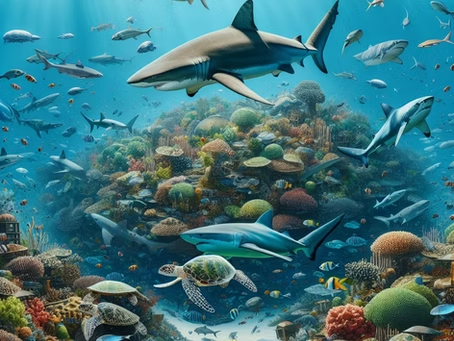Sharks and Their Importance
Sharks are often misunderstood and feared, yet they are crucial to maintaining healthy oceans. As apex predators, they regulate marine species populations and ensure ecosystem stability. Unfortunately, overfishing, shark finning, and habitat loss have led to sharp population declines. This article explores their ecological value, threats, and how we can act to protect them.
Key Takeaways
- Sharks regulate marine ecosystems by controlling other species’ populations.
- Overfishing, finning, and habitat loss drive severe declines in shark numbers.
- Marine protected areas (MPAs) offer sharks safe havens to recover.
- International cooperation and local initiatives are vital for long-term conservation.
- Individual choices, from sustainable seafood to advocacy, make a real difference.
Why Sharks Matter
Apex Predators and Biodiversity
As apex predators, sharks maintain balance in marine ecosystems by removing weak and sick individuals. This natural selection ensures species diversity and ocean health.
Support for Coral Reefs
Sharks keep reef systems thriving by regulating species that prey on reef-building organisms. Healthy shark populations are directly linked to vibrant coral ecosystems.
Threats Facing Sharks
Sharks face serious challenges:
- Overfishing and Bycatch: Commercial fishing often traps sharks unintentionally, reducing populations worldwide.
- Shark Finning: Driven by high demand, fins are cut off and sharks discarded, causing immense suffering.
- Habitat Loss: Pollution, coastal development, and climate change degrade breeding and feeding areas.
The Role of Marine Protected Areas
Safe Havens and Success Stories
MPAs provide essential refuge where sharks can recover. In some regions, shark populations have rebounded thanks to strict protections.
Implementation Challenges
Effective MPAs require enforcement and community support. Resistance from industries reliant on fishing highlights the need for collaboration.
Global and Regional Conservation Efforts
International agreements like CITES regulate shark trade, while NGOs and regional projects focus on direct protection and community engagement. Together, these efforts strengthen conservation outcomes.
How Individuals Can Help
- Choose Sustainable Seafood: Look for eco-certifications to avoid contributing to overfishing.
- Support Policy Change: Advocate for stronger protections through petitions and legislative action.
- Raise Awareness: Share knowledge, join events, and promote education to shift perceptions.
Sharks as Ocean Health Indicators
Sharks reveal the state of marine environments. Their disappearance signals ecological imbalance, while their presence ensures reef health, disease control, and species vitality.
Community and Education
Local communities can lead conservation through beach cleanups, citizen science, and workshops. Education builds empathy and drives collective action for shark survival.
Economic Value of Conservation
Ecotourism
Shark tourism generates jobs and revenue, proving sharks are more valuable alive than dead.
Sustainable Fisheries
With billions reliant on seafood, shark protection supports livelihoods and global food security.
Conclusion
Sharks are vital guardians of the sea, ensuring biodiversity and ecosystem balance. By protecting them through policy, education, and sustainable choices, we can safeguard both marine health and human prosperity. Every action counts—together we can ensure sharks thrive for generations to come.

